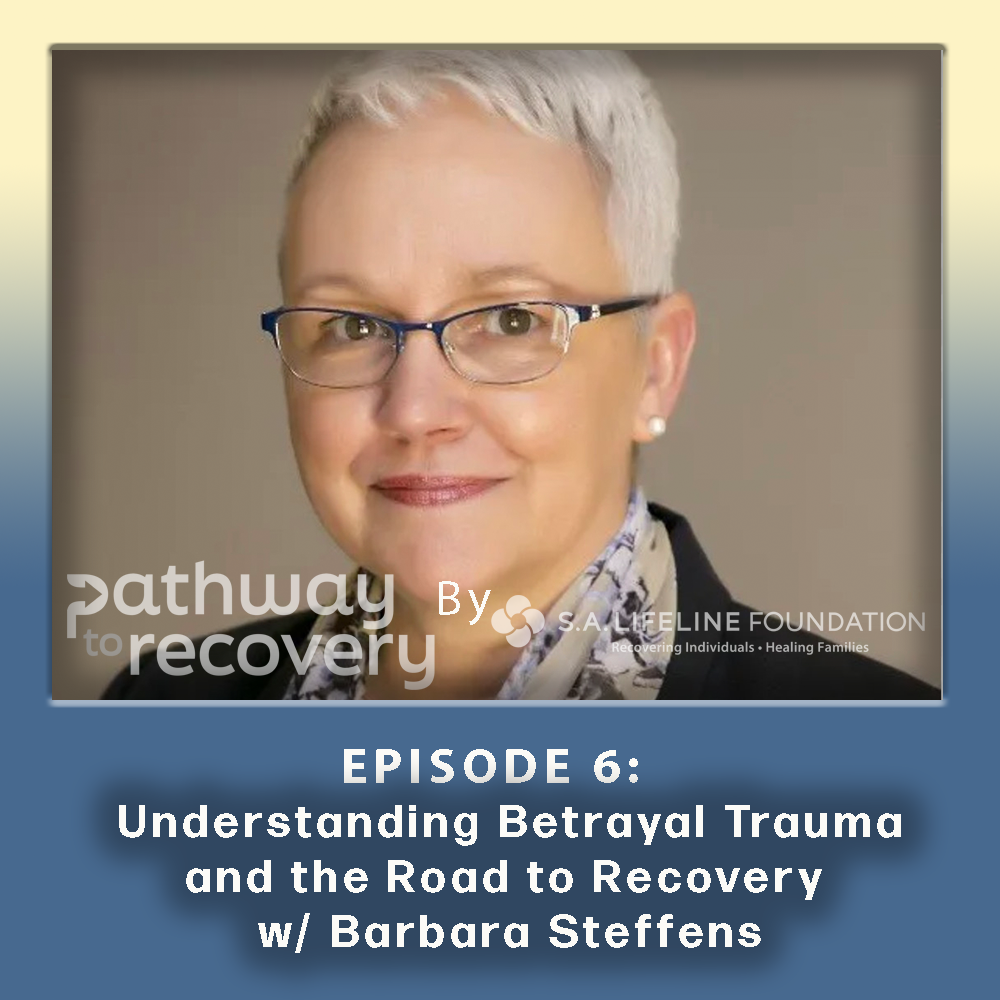Note: The following excerpts were taken from a Pathway To Recovery Podcast Episode where S.A. Lifeline Executive Director, Tara McCausland interviewed the esteemed Dr. Barbara Steffens.
“I have worked with partners for over 25 years, and the betrayal from their loved one is horrific. But additional betrayal is when they go to seek help and they’re given bad information or wrong advice. That’s another betrayal.
To Therapists:
Get advanced training so that you can specialize in helping these individuals.
Don’t just read a book because that’s not going to give you the experience as well as the information that you need to really know how to be with and attend to someone who’s traumatized. Someone who is traumatized within a primary relationship. It is different. So get specialized care. When I’m doing training, I have trained hundreds of people on how to assist the betrayed partners, I always just praise them for taking advanced training because it says they want to do better and they want to be ethical providers.
So please don’t say that you know how to help someone with this unless you have specialized training. Too many partners get hurt again by ill-informed, untrained therapists or coaches. So that’s the first thing – get training. The good news is that there’s good training out there. I was part of founding an organization that provides training on how to help betrayed partners, APSATS. It’s the Association for Partners of Sex Addicts, Trauma Specialists, APSATS.
But now we’re training people on how to help the family, including children, not just the partner, and how working together can also help the relationship. Specialized training is out there. Please take advantage and get that training.
The Importance of Staying Present:
Also, know that in the olden days, one of the first things a partner was asked when she came in after being betrayed was, what kind of abuse have you had in your childhood?
So they were totally skipping over the fact that this person’s walking in to talk to you or seeing you virtually, and they’re bleeding out, you know? And so now you’re wanting to ask them about history. Don’t ask them about history. Ask them about what’s going on for them now. What do they need right now? Stay in the here and now and don’t jump to history.
APSATS has developed a model for recovery or healing from this kind of trauma. And we start with the here and now. We start with being safe and finding a sense of stabilization, then grief and doing the trauma work, and then moving forward and growing. And then if there are historical abuses that this person hasn’t attended to, then you focus on that. Don’t start there. That’s why a lot of partners have not gotten the support they need because they go in for support and they feel like, ‘Oh, here’s another person blaming me. There’s something wrong with me or I wouldn’t have picked this person who did this to me.’
That’s blaming the victim. Don’t do that.
Counsel To Faith Leaders About Betrayal Trauma:
For faith leaders, (my thoughts are) very similar. Don’t give advice or tell people what to do when you don’t have a clue what a betrayed partner might be feeling and experiencing. Understand, faith leader, that this is not a marriage issue, it’s something that’s happened within the marriage.
If these people are married, it’s happened within the relationship, and it happened to the partner. It’s not because the marriage wasn’t healthy or strong; it’s because someone has out of control sexual behaviors, and that has brought itself into the relationship. So don’t assume and don’t recommend marriage counseling, traditional marriage counseling right away.
That’s not helpful. So it’s probably individual support for a while and then sooner rather than later, having them come together with others, understanding each other’s experience and what recovery is going to look like, but this is not the time for marriage counseling. This is a crisis intervention for a relationship early on.
A Word of Caution:
Don’t tell the partner to just have more sex, because this is not about having enough sex. This is an addiction that shows itself in sexual behavior, but it’s not about lack of sex. Most partners, or many partners feel sexually abandoned or neglected in their relationship because that’s been going elsewhere.
So don’t assume. This is not a sex issue. This is something that has happened and there’s a sexual betrayal piece of it for the partner. If you communicate about just having sex more often, being more sexual, that totally misses the sexual trauma that this partner is probably experiencing.
So faith leaders, get some education. Work with good therapists who understand and know how to help and release your person, your parishioner, your person in your congregation, to trained providers to help them. You are there to pray with them, for them, encourage them, love them, to be there for them as part of their support, but don’t hang on to them.
They’re now seeing their therapist because you’re not their therapist, that’s not your role. That may sound stern, but again, I’m saying that because I’ve heard so many partners who want to go to their faith community, their faith leader for that kind of support, and they leave feeling wounded, blamed and alone, and we don’t want to do that.
Getting More Information
For both (therapists and faith leaders,) get more information. There are lots of people I know who offer training. My organization, APSATS, has done some training for faith organizations on how to be more trauma-informed and how to give support. So find people that can do that for you to help you.
We don’t expect you to take care of this. We have specialists now that can do this.”
Listen to the entire episode here.








